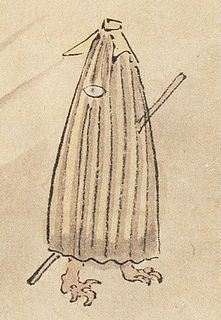 W
WAn abumi-guchi is a strange, furry yōkai, or Japanese monster, that is illustrated in Sekien Toriyama's Gazu Hyakki Tsurezure Bukuro.
 W
WA Bakezōri is a fictitious being from Japanese folklore belonging to the group of Yōkais.
 W
WThe Biwa-bokuboku is a fictitious being from Japanese folklore. It belongs to a group of yokai and is said to have an ambivalent character.
 W
WThe Boroboroton is a tsukumogami yōkai, and is believed to be evil and dangerous to humans.
 W
WChōchin-obake is a Japanese yōkai of chōchin, "[the] lantern-spook (chochinobake) ... a stock character in the pantheon of ghouls and earned mention in the definitive demonology of 1784." They can also be called simply chōchin, bake-chōchin, obake-chōchin, and chōchin-kozō.
 W
WKasa-obake are a mythical ghost or yōkai in Japanese folklore. They are sometimes, but not always, considered a tsukumogami that old umbrellas turn into. They are also called "karakasa-obake" (から傘おばけ), "kasa-bake" (傘化け), and "karakasa kozō" (唐傘小僧).
 W
WThe koto-furunushi is a fictitious being from Japanese folklore. It is a Yōkai and is said to be harmless to humans. The koto-furunushi is very similar to the yokai biwa-bokuboku.
 W
WMenreiki (面霊気) is a type of yōkai in Japanese folklore, composed of Gigaku masks. It is listed within the 1781 compendium of Japanese supernatural entities, entitled Gazu Hyakki Tsurezure Bukuro.